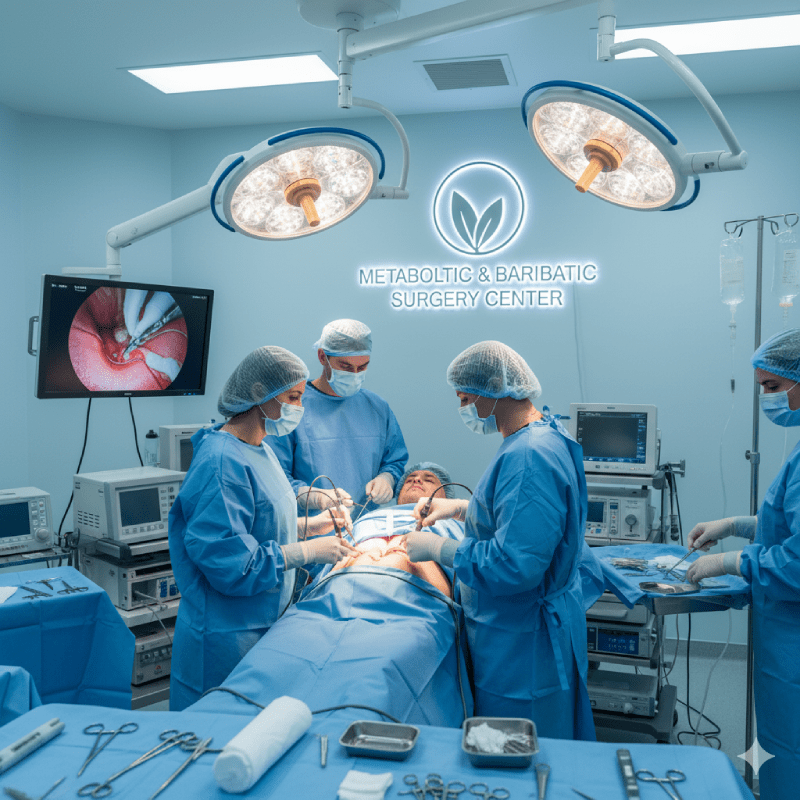Gastric sleeve, commonly known as “sleeve gastrectomy,” is one of the most frequently performed surgical procedures for the treatment of obesity. The surgery involves the permanent removal of a large portion of the stomach, which restricts food intake and reduces appetite. This comprehensive guide was prepared to answer the 35 most common questions about the pre-operative, operative, post-operative, and long-term lifestyle changes associated with the surgery.
What is Gastric Sleeve Surgery?
Gastric sleeve surgery is a procedure in which a large section of the stomach, known as the fundus and body, is surgically removed, and the remaining stomach is reshaped into a tube-like, banana-shaped structure. The stomach volume is significantly reduced, while the normal path of food through the digestive system remains unchanged. Approximately 75-80% of the stomach is removed, leading to a feeling of fullness with less food and a goal of weight loss.
Who is a Candidate for Gastric Sleeve Surgery?
Generally accepted criteria for gastric sleeve surgery include: individuals with a Body Mass Index (BMI) of 40 or higher, or individuals with a BMI between 35 and 39.9 who have serious obesity-related health problems such as type 2 diabetes, high blood pressure, or sleep apnea. In addition, individuals who understand the potential risks and are psychologically prepared to make the necessary lifestyle changes after surgery are also suitable candidates.
How is the Surgery Performed?
Gastric sleeve surgery is typically performed using a minimally invasive method called laparoscopic surgery. In this procedure, a camera and surgical instruments are inserted through several small incisions in the abdomen. The surgeon watches the inside of the abdomen on a monitor, cuts the stomach, and staples the remaining part with special surgical staplers. The removed portion of the stomach is then taken out through one of the incisions.
How Long Does the Surgery Take?
The duration of the surgery varies depending on the patient’s anatomical structure, any previous surgeries, and the surgeon’s experience. Generally, a gastric sleeve procedure takes between 45 to 90 minutes to complete. This includes the total time for the surgeon’s preparation and post-operative procedures.
How Much Weight Can Be Lost After Surgery?
Weight loss is fastest in the first year following the surgery. Patients typically lose an average of 60% to 70% of their excess weight. Rapid weight loss occurs in the first 6 months, after which the rate of loss slows down. This process varies from person to person depending on the patient’s diet, exercise habits, and overall health status.
Is the Surgery a Permanent Solution?
Yes, gastric sleeve surgery is a permanent procedure because a large portion of the stomach is irreversibly removed. However, the surgery alone does not guarantee weight loss. Failure to adapt to post-operative lifestyle changes can lead to stomach stretching and weight regain over time. For permanent success, the surgery must be supported by a healthy diet and regular exercise.
What Are the Risks and Complications of the Surgery?
As with any surgical procedure, gastric sleeve surgery has potential risks and complications. These include bleeding, infection, risks related to anesthesia, leakage at the staple line, blood clots, and wound infections. With an experienced surgeon and proper post-operative care, these risks are minimized.
What Preparations Are Necessary Before Surgery?
Before surgery, patients undergo a comprehensive evaluation process. This includes blood tests, an EKG, a chest X-ray, an endoscopy, and a psychological evaluation. The surgeon and a dietitian determine a pre-operative weight loss and nutrition plan. It is important for patients to quit smoking and strictly adhere to their pre-operative diet.
How Long is the Hospital Stay After Surgery?
The length of the hospital stay after gastric sleeve surgery depends on the patient’s overall condition and recovery speed. Most patients stay in the hospital for an average of 2 to 3 days after the surgery. During this time, the surgical team closely monitors the patient’s condition, manages pain, and oversees the initial stages of feeding.

What Should Post-Surgery Nutrition Be Like?
Post-surgery nutrition is a phased process. Patients start with liquid foods for the first few weeks, then progress to pureed foods, and finally to solid foods. It is crucial to strictly follow a special nutrition plan prepared by a dietitian. Portions should be very small, and meals should be eaten slowly and chewed thoroughly.
How is Post-Surgery Pain Managed?
Pain experienced after surgery is usually minimal and can be easily controlled with pain medication. Because the laparoscopic method is used, the pain is much less than with open surgery. Painkillers are administered intravenously while you are in the hospital. At home, you can use the prescribed oral painkillers. The pain will decrease within a few days.
When Can Normal Life Be Resumed?
Most patients can return to work or their normal daily activities within approximately 1 to 2 weeks after the surgery. However, it is recommended to avoid heavy lifting and strenuous activities for the first 4 to 6 weeks. This timeline varies depending on the type of work and the individual’s recovery rate. It is important to listen to your body’s signals.
When Can I Start Exercising?
It is important to start with light walks in the first few days after surgery to improve blood circulation and reduce the risk of blood clots. It is generally recommended to wait 4 to 6 weeks before starting heavy or strenuous exercises (such as weight lifting or running). Following your surgeon’s and dietitian’s guidance is critical for a safe recovery.
Are Vitamin and Mineral Supplements Necessary?
Yes, vitamin and mineral supplements are usually required for life after surgery. Due to the smaller stomach size and reduced absorption of certain nutrients, the body cannot get sufficient vitamins and minerals. Therefore, regular use of supplements such as vitamin B12, vitamin D, iron, and calcium is vital to prevent nutritional deficiencies.
What Are the Psychological Effects of the Surgery?
Surgery brings about a psychological change process as well as a physical one. Weight loss can contribute to increased self-confidence and an improved social life. However, some patients may experience difficulties due to their changed relationship with food. Therefore, pre-operative psychological counseling and post-operative support groups are highly beneficial.
Will the Stomach Regain Its Original Size?
Since a part of the stomach is permanently removed in gastric sleeve surgery, the stomach cannot return to its original size. However, the remaining part of the stomach has the ability to stretch. If a patient does not follow the post-operative dietary rules and consistently eats excessive amounts of food, the remaining stomach can stretch over time. This can lead to weight regain and a failure of the surgery.
How Much Does the Surgery Cost?
The cost of gastric sleeve surgery varies depending on the surgeon’s experience, the hospital’s quality, the type of materials used, and the country where the surgery is performed. In Turkey, prices in private hospitals and clinics may vary according to the services offered. The most accurate information about the price can be obtained by contacting the surgeon or hospital where you plan to have the surgery.
Is the Surgery Covered by Insurance?
Private health insurance or public health institutions (like SGK in Turkey) may cover bariatric surgery under certain conditions. These conditions typically include BMI criteria (e.g., BMI of 40 or higher) and the presence of co-morbidities related to obesity. For clear information on insurance coverage, you should contact your insurance provider or the institution’s officials.
Who is Not a Suitable Candidate?
Gastric sleeve surgery may not be suitable for individuals with obesity-unrelated eating disorders (such as bulimia nervosa), alcohol or substance dependence, psychological issues that would prevent them from coping with the risks and lifestyle changes, and some chronic illnesses. The final decision is made after a comprehensive evaluation by a multi-disciplinary team.
Is Hair Loss Common After Surgery?
Hair loss is quite common in the first 6 months after surgery due to rapid weight loss and changes in nutrient intake. This condition is usually temporary, and hair will regrow once the body adapts and nutrition stabilizes. Vitamin and mineral supplements can help mitigate this.
When Does Weight Loss Stop?
Weight loss after surgery typically slows down and stops within 12 to 18 months. During this period, it is important for the patient to maintain their new weight. The cessation of weight loss does not mean the surgery has failed; rather, it is a sign that the body has reached its new equilibrium. This is the stage of weight maintenance.

Is Pregnancy Possible After Surgery?
Yes, pregnancy is possible after surgery. However, it is recommended that women planning a pregnancy should avoid becoming pregnant for 12 to 18 months after the surgery. Pregnancy during the rapid weight loss period can be risky for both the mother and the baby. The body should be allowed to stabilize and its nutritional status to balance out during this time.
What Are the Long-Term Effects of the Surgery on the Body?
Gastric sleeve surgery largely improves or eliminates obesity-related diseases (such as diabetes, hypertension, sleep apnea, etc.). In the long term, it leads to a healthier life, increased energy levels, and a significant improvement in quality of life. However, vitamin and mineral supplements must be taken regularly for life.
Does it Cause Reflux?
Due to the removal of the fundus part of the stomach, gastric sleeve surgery can cause post-operative reflux in some patients. This is related to an increase in stomach pressure and a change in the function of the gastric valve. It can often be controlled with medication, but in some cases, a surgical correction may be necessary.
Does Diabetes (Type 2) Improve After Surgery?
Gastric sleeve surgery is highly effective in improving or completely resolving type 2 diabetes. Rapid weight loss and hormonal changes after surgery reduce insulin resistance and normalize blood sugar levels. A large number of diabetic patients who undergo the surgery no longer need insulin or other diabetes medications afterward.
Does Medication Use Change After Surgery?
Yes, after surgery, many patients can reduce or completely stop the medications they take for obesity-related conditions (such as high blood pressure, diabetes, and high cholesterol). This is directly related to weight loss and metabolic improvement. Any changes in medication dosage must be done under the supervision and guidance of a doctor.
Are There Any Scars Left?
Because laparoscopic surgery is performed, the surgical scars are very small (usually less than 1 cm). These small incisions become almost invisible over time. The appearance of the scars depends on the individual’s skin type, wound healing rate, and the surgeon’s technique. The cosmetic outcome of the surgery is very satisfactory.
How Are Alcohol and Tobacco Consumption Affected?
Alcohol consumption after surgery becomes much more dangerous due to rapid absorption in the smaller stomach. Alcohol contains “empty calories” with no nutritional value, which can hinder weight loss and even cause weight regain. Smoking negatively affects the post-operative recovery process, delays wound healing, and increases the risk of complications. Therefore, both should be avoided.
How Long Does the Surgical Team Follow Up?
Post-operative follow-up is vital for success. Patients meet regularly with their surgeon, dietitian, and other specialists during the first year after surgery (for example, at 1, 3, 6, and 12 months). Annual check-ups are recommended in subsequent years. These follow-ups are important for monitoring nutritional status, detecting vitamin deficiencies, and providing psychological support.
What Should Be Done If Weight is Regained After Surgery?
Weight regain after surgery is usually a result of not following nutritional rules or a lack of exercise. If weight regain occurs, professional support should be sought from a dietitian and a psychologist. The underlying reasons should be determined, and lifestyle changes should be re-evaluated. In rare cases, additional surgical intervention may be required.
How is the Surgical Method Determined?
Gastric sleeve surgery is the most common bariatric surgery method. However, the surgical method is determined based on the patient’s health status, eating habits, and co-morbidities. A different surgical method, such as gastric bypass, may be more suitable for patients with severe reflux, diabetes, or other metabolic problems. This decision is made by the surgeon after a comprehensive evaluation.
What is the Difference Between Gastric Sleeve and Gastric Botox?
Gastric botox is a procedure that slows down the contraction of stomach muscles, reducing appetite and prolonging the feeling of fullness. This procedure is not surgical and not permanent. Gastric botox is suitable for people with a lower BMI, and its effect typically wears off after 6 months. Gastric sleeve, on the other hand, is a permanent surgical solution designed for patients with morbid obesity.
What is the Difference Between Gastric Sleeve and Gastric Balloon?
A gastric balloon is a silicone balloon placed in the stomach via endoscopy and filled with liquid or air. It creates a feeling of fullness by taking up space in the stomach and restricts food intake. This procedure is not surgical and is usually removed after 6 to 12 months. Gastric sleeve, on the other hand, is a permanent surgical procedure that reduces stomach volume.
Does Sexual Life Change After Surgery?
With weight loss, most patients’ self-confidence increases, energy levels rise, and body image changes positively. This can also have a positive effect on sexual life. After surgery, it is recommended to avoid sexual activity for the first few weeks without your surgeon’s approval. If you have any concerns about this, do not hesitate to talk to your surgeon openly.
Is It Suitable for People with Eating Disorders?
Gastric sleeve surgery is not a treatment for eating disorders. It is generally not a suitable method for individuals with bulimia nervosa or other serious eating disorders. Eating disorders can lead to weight regain and even more serious health problems after surgery. Therefore, a pre-operative psychological evaluation is of vital importance for the detection of eating disorders.



